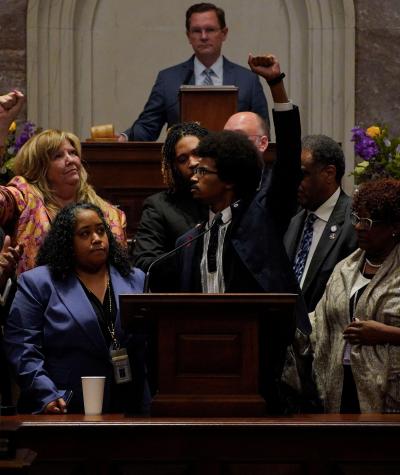All eyes are on Tennessee this week following the expulsion of two democratically-elected state house members, representing approximately 130,000 Tennesseans in Nashville and Memphis, the state’s most diverse cities.
Both the ousted legislators are young, Black men. The move raises serious concerns about the Legislature’s racial motivations and respect for free speech. This latest stunt, however, is just the tip of the iceberg when it comes to the undemocratic, inequitable electoral practices in the state.
For years, advocates have sounded the alarm on a larger crisis of democracy in Tennessee and the need for comprehensive reforms to protect the freedom to vote, especially for Black Tennesseans. These calls have largely been ignored because of a national focus on “purple” states with more competitive statewide politics, but our democracy is strongest when every voter can make their voice heard in red, purple, and blue states alike.
In Tennessee, achieving an equitable democracy will require a dramatic overhaul of an entrenched set of discriminatory practices. Tennessee consistently ranks near the bottom of states in both voter registration and voter turnout.
In fact, one 2022 study, drawing on 51 indicators of democratic health, found that Tennessee is the least democratic state in the country. This is not happenstance; it is a result of a concerted effort to erect and maintain barriers to equitable representation on every front.
To start, Tennessee has one of the most restrictive, discriminatory, and, quite frankly, punitive voting systems in the country. Vote-by-mail is only available to those that meet certain strict criteria; first-time registrants can never vote by mail (even if they are out-of-state during the voting period); and it is a felony for someone other than election officials to give an absentee ballot application to anyone.
Tennessee also has strict and nonsensical identification requirements that prohibit students from using their university IDs while allowing professors to use theirs. And following successful Black voter mobilizations efforts in 2018, Tennessee passed the most draconian restrictions on voter registration activity in the country, which were quickly halted by a federal court for likely violating the First Amendment.
Tennessee also has the most convoluted and most racially discriminatory felony disenfranchisement system in the country. Like felony disenfranchisement schemes across the United States, Tennessee’s laws taking away the right to vote after a felony conviction are rooted in racist, Jim Crow-era efforts to stop Black people from exercising their political power.
Even today, the state disenfranchises 20 percent of its Black citizens and nearly 10 percent of Latino citizens – the highest rates of any state in the union.
Recently, a prosecutor weaponized Tennessee’s complex rights restoration scheme to incarcerate Pamela Moses, a politically active formerly incarcerated person who believed her rights had been restored because the State told her they were. Ms. Moses’ conviction was overturned, but such prosecutions inevitably intimidate eligible voters impacted by the criminal legal system.
Even for those individuals who can vote and successfully cast ballots, partisan gerrymandering systemically denies voters full and fair representation. There is not a single competitive district in the state senate or among Tennessee’s federal congressional districts.
Last year, the state legislature “dismembered” Nashville’s Democratic congressional district and split the voters in Nashville across three sprawling, Republican-dominated districts to diminish their voting power. The result was a lopsided, un-democratic gerrymander.
Lawmakers manipulated voting maps at the state level as well, and one representative who was carved out of her original district narrowly survived her own expulsion vote last week. Although 37 percent of Tennesseans voted for President Biden in 2020, only one of the state’s nine federal congressional districts (covering Memphis) is represented by a Democrat.
Through felony disenfranchisement, gerrymandering and discriminatory laws that target Black and brown voters, Tennessee’s lawmakers have consistently overruled the will of the people. The legislature fought Memphis’ bid to implement ranked choice voting after citizens passed a ballot initiative supporting the measure and are advancing another bill to remove or limit local government control over certain issues, like including potentially abolishing the Nashville police community oversight board that has been in operation since Nashville voters approved it in 2018.
Our democracy works best when everyone can participate. Yet millions of Tennesseans, disproportionately Black and brown voters, are denied full and fair representation. The expulsion of Representative Jones and Pearson, who represent a combined total of over 130,000 Tennesseans, is par for the course in a system so corroded that legislators no longer feel any obligation to respect the will of voters.
We must treat this as the wake-up call that it is, for Tennessee and the nation. Both Representatives Jones and Pearson have been reinstated, but we cannot let that be the end of our work to reform democracy.
Protecting our democracy requires constant vigilance and we must recommit ourselves to ending felony disenfranchisement, erecting equitable voting systems and adopting fair maps so that Tennesseans, and all Americans, have a transparent, inclusive and responsive government.
Democracy reform in Tennessee is long-past due, and with the whole world watching, now is the time to demand action.



